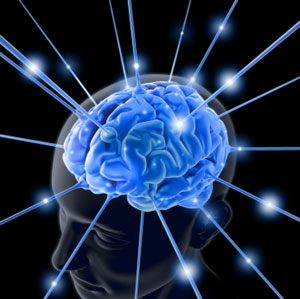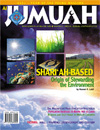On the Human Mind, Content Physicians, and Reviving Medicine
 |
A brief treatment of neurological pathologies and a critique of modern
Muslims in medicine
"Poor Lou could hardly move his head" observed Jack Kieran shortly after his final visit with Gehrig, the baseball great of the 1920s and 30s. "But he said to me, ''this is the crisis, Jack. After this, VU gradually get better'. 1 nodded in agreement, ready to cry as I walked home" Former teammates Bill Dickey and Tommy Henrich also called on Gehrig during the final days of his life, astonished at his positive attitude. "I'll never forget as we walked out the door," recalled Henrich. "Lou called to us and said, 'So long guys. I'm going to beat this thing! He never lost his positive attitude."
- Lou Gehrig: A Biography
In many ways, I see correlations between my own sister and the celebrated, American baseball legend, Lou Gehrig. Both, in the face of the daunting fact that their bodies' electrical springs of life were threatened by disease-caused drought, somehow managed to maintain optimism, to see electricity in the dark, to feel those popping impulses when their was no initial depolarization, to move forward in life with all the intact faculties that they possessed.
When I watch my sister run up and down our long winding driveway, listen to her little white gym shoes tap the earth with a rhythmic percussive beat- one mile, two miles, three, four, five-I hear the sounds of baseball, die resonance of persistence and authentic human progression, not malignant disease-born progression.
But how long can she hold out against the inevitable reality of the enigmatic nature of a neurological disease? Will she have to wait for the human mind to be completely mapped and thoroughly understood? Lou waited and waited and hoped for the best, but for all his heroic waiting, he could not wait forever. His time ran out.
And I now ask myself, how many people like Lou and my sister have waited and are still waiting for a cure?
I like to think that some kind of Flemingesque discovery (Alexander Fleming, who discovered penicillin, that is) is going to take place in some faraway laboratory and by mere circumstance or sheer brilliance-a cure to Lou's successive paralysis and my sister's frayed nerves. But the human nervous system is much too sophisticated and subtle for a relatively simple single chemical to resolve the broad spectrum of nervous related disorders.
Multiple Sclerosis, which my sister has, is a disorder that chiefly involves the brain, one of the most complex objects in the universe. Neurological disorders are notoriously complex. If you are not convinced just how complex the brain really is, try to comprehend this: You have no less than 100 billion neurons, each neuron having on average about 10 thousand discontinuous contacts, that's on the order of 101S, about a half-billion per cubic millimeter. Blessed be Allah, the very best of creators.
Direct trauma can cause a neurological disorder. But in many cases, die neurons, which function as signaling pathways, are slowly destroyed by progressive diseases that leading to a host of neurological maladies.
Infection too has been blamed for neurological problems, like naturopathy. But who knows for sure?
Not to make a blunt and abrupt analogy, but if you were to take, for example, a European vehicle to American- only mechanic shop, chances are the American mechanic would experience difficulty in diagnosing the trouble with the car, having no prior experience with die structure of the foreign vehicle.
Similarly, and until recently, no one imagined that our brain might be as complex as the discoveries of modern neuroscience have revealed, and naturally doctors and scientists continue to experience difficulty in diagnosing and understanding this host of unique diseases. If we don't understand the mechanisms behind the disease, then discovering a cure will remain extremely difficult.
So is there any hope in combating this unique set of mysterious diseases of the enigmatic organ we call the brain? The good news is that research communities around the world have actually made great steps to understand the nature of neurological pathologies and where they come from. While the causes are semi- known, research is perpetually turning up new contributing factors to the causes of neurological disorders.
But the fact remains that the presence and modern contributions of Muslims in medical research remains negligible. Now, I am not denying that there are Muslims contributing to medical research globally. However, I am asserting that modern Muslim practitioners and physicians have largely withdrawn from the creative research fronts that they used to dominate among our religious forebears. In our time, you just don't hear of Muslim physicians and researchers placing their souls, their inner beings, into the attainment of knowledge, the acquisition of new discoveries and cures.
We must collectively face the fact that we have resigned from the incomparable spiritual caliber that our greatest scholars clearly occupied. Let's just briefly look at the contributions of a few select scholars and their contributions to humanity so we can have an idea of where we are currently.
Muhammad Ibn Zakariyya al-Razi was the first physician in history who described in detail the symptoms and signs of smallpox and measles based on clinical examination. He was also die first to distinguish between them by putting forth what is now called the differential diagnosis.
Salahuddin ibn Yusuf from Hammah (Syria) wrote in 1290 CE a book called The Light of the Eyes, in which he discussed new work on the optical theory of vision.
The author of one of the earliest surgical books was Serafeddin Sabuncuoglu. In 1465, he wrote a surgical book in Turkish, which contained not only pictures or miniatures of pediatric surgical procedures, but also many important and major new contributions to surgical literature.|
Abu al-Qasim Khalaf Ibn al-Abbas Az- Zahrawi (936-1013), also known in the West as Abulcasis, authored comprehensive medical texts that shaped both Islamic and European surgical procedures up until the Renaissance. His greatest contribution to history is the Kitab al-Tasrif, a 30-volume encyclopedia of medical practices.
I could go on and on, but it would take a year's worth of issues of this magazine to begin to do our forefathers justice. The point remains, however, that we are greatly deficient in our acquisition of knowledge and that we, speaking on behalf of all my brothers and sisters who are going into medicine, have to gain what we have for so long forsaken.
It is absolutely imperative that we teach ourselves to view our venture into the medicinal world as the undertaking of a lifetime. We must excel in medicine, and by this I mean making real, solid contributions to our fellow human beings. We must be creative and thoughtful with our research. We should not be content to have MDs and DOs and sundry specialty initials trailing after our names, for that is only the beginning of the journey.
And most of all, we must enter with the intention to please Allah, to save a soul, to make a positive impression on the health of someone else. If we can form a generation similar to the men and women we hear about from our past, I can assure you with all confidence that even the most complicated neural disorders will be cured...
... So that people like my sister with MS, and Lou Gehrig with ALS, will be healed.
*****
Article provided by Al Jumuah Magazine, a monthly Muslim lifestyle publication, which addresses the religious concerns of Muslim families across the world.
To subscribe please visit https://www.aljumuah.com/subscription
Topics: Health Values: Contentment
Views: 6972
Related Suggestions


















